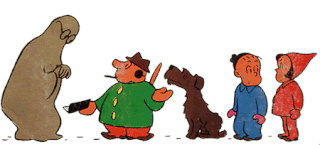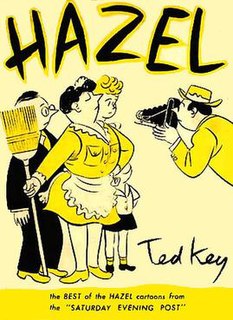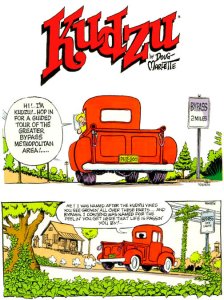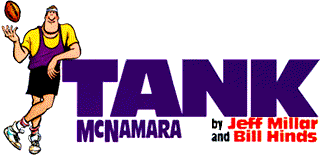 W
WAdam@home is an American syndicated gag-a-day comic strip created by Brian Basset and currently drawn by Rob Harrell. Started in 1984, it follows the life of Adam Newman, a stay-at-home dad, as he juggles his family and career. Originally focusing on office-place humor, the comic's tone shifted when Adam became a stay-at-home consultant.
 W
WBaldo is an American comic strip written by Hector Cantú and illustrated by Carlos Castellanos. It was launched on April 17, 2000.
 W
WBarnaby is a comic strip which began April 20, 1942 in the newspaper PM and was later syndicated in 64 American newspapers.
 W
WBarney Google and Snuffy Smith, originally Take Barney Google, F'rinstance, is an American comic strip created by cartoonist Billy DeBeck. Since its debut on June 17, 1919, the strip has gained a large international readership, appearing in 900 newspapers in 21 countries. The initial appeal of the strip led to its adaptation to film, animation, popular song, and television. It added several terms and phrases to the English language and inspired the 1923 hit tune "Barney Google " with lyrics by Billy Rose, as well as the 1923 record, "Come On, Spark Plug!"
 W
WBlondie is an American comic strip created by cartoonist Chic Young. The comic strip is distributed by King Features Syndicate, and has been published in newspapers since September 8, 1930. The success of the strip, which features the eponymous blonde and her sandwich-loving husband, led to the long-running Blondie film series (1938–1950) and the popular Blondie radio program (1939–1950).
 W
WBloom County is an American comic strip by Berkeley Breathed which originally ran from December 8, 1980, until August 6, 1989. It examined events in politics and culture through the viewpoint of a fanciful small town in Middle America, where children often have adult personalities and vocabularies and where animals can talk.
 W
WCathy is an American gag-a-day comic strip, drawn by Cathy Guisewite from 1976 until 2010. The comic is about a woman, Cathy, who struggles through the "four basic guilt groups" of life—food, love, family, and work. The strip gently pokes fun at the lives and foibles of modern women. The strip debuted on November 22, 1976, and appeared in over 1,400 newspapers at its peak. The strips have been compiled into more than 20 books. Three television specials were also created. Guisewite received the National Cartoonists Society Reuben Award in 1992 for the strip.
 W
WA Couple of Guys was a comic strip about the lives of a gay male couple, their friends and family in New York City. The strip was first published in September 1996 and was written and drawn by Dave Brousseau. The strip ended in February 2018 because of high production costs and Brousseu's wishes.
 W
WDennis the Menace is a daily syndicated newspaper comic strip originally created, written, and illustrated by Hank Ketcham. It debuted on March 12, 1951, in 16 newspapers and was originally distributed by Post-Hall Syndicate. It is now written and drawn by Ketcham's former assistants, Marcus Hamilton, Ron Ferdinand, and son Scott Ketcham, and distributed to at least 1,000 newspapers in 48 countries and in 19 languages by King Features Syndicate. The comic strip usually runs for a single panel on weekdays and a full strip on Sundays.
 W
WDilbert is an American comic strip written and illustrated by Scott Adams, first published on April 16, 1989. The strip is known for its satirical office humor about a white-collar, micromanaged office featuring engineer Dilbert as the title character. The strip has spawned dozens of books, an animated television series, a video game, and hundreds of Dilbert-themed merchandise items. Dilbert Future and The Joy of Work are among the most read books in the series. Adams received the National Cartoonists Society Reuben Award in 1997 and the Newspaper Comic Strip Award in the same year for his work on the strip. Dilbert appears online and in 2,000 newspapers worldwide in 65 countries and 25 languages.
 W
WDondi is a daily comic strip about a large-eyed war orphan of the same name. Created by Gus Edson and Irwin Hasen, it ran in more than 100 newspapers for three decades.
 W
WThe Family Circus is a syndicated comic strip created by cartoonist Bil Keane and, since Bil's death in 2011, is currently written, inked, and colored by his son, Jeff Keane. The strip generally uses a single captioned panel with a round border, hence the original name of the series, which was changed following objections from the magazine Family Circle. The series debuted on February 29, 1960, and has been in continuous production ever since. According to publisher King Features Syndicate, it is the most widely syndicated cartoon panel in the world, appearing in 1,500 newspapers. Compilations of Family Circus comic strips have sold over 13 million copies worldwide.
 W
WGarfield is an American comic strip created by Jim Davis. Originally published locally as Jon in 1976, then in nationwide syndication from 1978 as Garfield, it chronicles the life of the title character, Garfield the cat; Jon Arbuckle, his human owner; and Odie, the dog. As of 2013, it was syndicated in roughly 2,580 newspapers and journals, and held the Guinness World Record for being the world's most widely syndicated comic strip.
 W
WGasoline Alley is a comic strip created by Frank King and distributed by Tribune Content Agency. It centers on the lives of patriarch Walt Wallet, his family, and residents in the town of Gasoline Alley, with storylines reflecting traditional American values.
 W
WGet Fuzzy is an American gag-a-day comic strip written and drawn by Darby Conley. The strip features the adventures of Boston advertising executive Rob Wilco and his two anthropomorphic pets, a dog named Satchel Pooch and a cat called Bucky Katt.
 W
WHazel was a single-panel cartoon series by Ted Key about a live-in maid who works for a middle-class family. Launched in 1943, Hazel ended September 29, 2018.
 W
WHeathcliff is an American comic strip created by George Gately in 1973, featuring the title character, an orange cat. Now written and drawn by Gately's nephew, Peter Gallagher, it is distributed to over 1,000 newspapers by Creators Syndicate, who took over the comic from McNaught Syndicate in 1988.
 W
WIt's Geek 2 Me is a tech cartoon about people and their off-center relationships with computers, the Internet, social networks, smart phones, mp3 players, e-book readers and other technologies, created by Pittsburgh-based Indian-American cartoonist, Francis Cleetus. He got the idea for the cartoon when a frantic intern rushed into his office and asked where the any key was on his computer keyboard. It's Geek 2 Me continued to evolve while Francis worked as a staff reporter for Dataquest magazine, and later as an advertising creative director on various tech brands.
 W
WKudzu was a daily comic strip by Pulitzer Prize-winning editorial cartoonist Doug Marlette about rural Southerners. Distributed by Universal Press Syndicate, the strip ran from June 15, 1981 to August 26, 2007.
 W
WLi'l Abner is a satirical American comic strip that appeared in many newspapers in the United States, Canada and Europe, featuring a fictional clan of hillbillies in the impoverished mountain village of Dogpatch, USA. Written and drawn by Al Capp (1909–1979), the strip ran for 43 years, from August 13, 1934 through November 13, 1977. The Sunday page debuted six months after the daily, on February 24, 1935. It was originally distributed by United Feature Syndicate, and later by the Chicago Tribune New York News Syndicate.
 W
WLife's Like That was a gag panel by Fred Neher which found humor in life's foibles. Spanning five decades -- from October 1, 1934 to August 20, 1977 -- the panel was initially distributed by Consolidated News Features, and later by the Bell-McClure Syndicate and the United Feature Syndicate.
 W
WLittle Orphan Annie is a daily American comic strip created by Harold Gray and syndicated by the Tribune Media Services. The strip took its name from the 1885 poem "Little Orphant Annie" by James Whitcomb Riley, and made its debut on August 5, 1924, in the New York Daily News.
 W
WThe Lockhorns is a United States single-panel cartoon created September 9, 1968 by Bill Hoest and distributed by King Features Syndicate to 500 newspapers in 23 countries. It is continued today by Bunny Hoest and John Reiner.
Motley's Crew was an American newspaper comic strip by Ben Templeton and Tom Forman with satirical social commentary. With readership spread among 250 newspapers in the United States alone, the comic strip acquired a highly devoted but relatively small group of fans during its 23 years of operation.
 W
WPeanuts is a syndicated daily and Sunday American comic strip written and illustrated by Charles M. Schulz that ran from October 2, 1950, to February 13, 2000, continuing in reruns afterward. Peanuts is among the most popular and influential in the history of comic strips, with 17,897 strips published in all, making it "arguably the longest story ever told by one human being". By the time of Schulz's death in 2000, Peanuts ran in over 2,600 newspapers, with a readership of around 355 million in 75 countries, and was translated into 21 languages. It helped to cement the four-panel gag strip as the standard in the United States, and together with its merchandise earned Schulz more than $1 billion.
 W
WPVT Murphy's Law is a comic strip by retired Army MSG, Mark Baker, which he began drawing/writing in 1992. Starting in 2000, the comic was published weekly in the Army Times for several years.
 W
WSmall Saves is a syndicated periodic comic strip written and illustrated by James DeMarco. Published weekly, the comic focuses on a young ice hockey goaltender named Small Saves and his adventures.
 W
WTank McNamara is a daily syndicated comic strip written and illustrated by Bill Hinds. The strip debuted on August 5, 1974, with Jeff Millar as writer and Hinds as illustrator. Hinds took over writing after the death of Millar in late November 2012 due to bile duct cancer.
 W
WZits is a comic strip written by cartoonist Jerry Scott and illustrated by Jim Borgman about the life of Jeremy Duncan, a 16-year-old high school sophomore. The comic debuted in July 1997 in over 200 newspapers and has since become popular worldwide and received multiple awards. As of 2010, it continues to be syndicated by King Features and is now included in "more than 1,700 newspapers worldwide in 45 countries and is translated into 15 different languages."